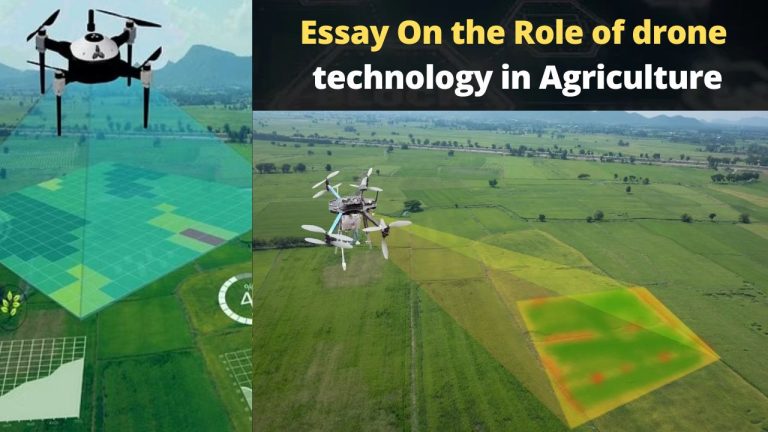"Advertisement"
Essay On the Role of drone technology in Agriculture
Hello My Dear Friend, In this post “Essay On the Role of drone technology in Agriculture“, We will be going to read about the Role of drone technology in Agriculture as an Essay in detail. So…
Let’s Start…
Essay On the Role of drone technology in Agriculture
Introduction
Technology improvements have revolutionized several industries throughout the years, including agriculture. Drone technology is one significant innovation that has recently gained recognition.
Drones, also known as unmanned aerial vehicles (UAVs), are self-flying devices that can be remotely controlled or designed to function independently.
Drones have emerged as a game-changing instrument in agriculture, revolutionizing farming practices and enhancing efficiency.
This paper investigates the role of drone technology in agriculture, emphasizing its advantages, applications, and possible impact on the industry.
Benefits of Drone Technology in Agriculture
1. Precision Farming:
Precision farming entails the use of technology to collect data and make informed judgments about farming practices.
Drones outfitted with a variety of sensors and cameras can collect high-resolution imagery as well as real-time data on crops, soil conditions, and weather patterns.
This data enables farmers to monitor their fields, predict possible difficulties such as pests or illnesses, and optimize fertilizer and irrigation use.
2. Improved Crop Monitoring:
Farmers used to have to manually inspect their fields to monitor crop health, which was a time-consuming and labor-intensive operation.
Drones with thermal or multispectral cameras may record detailed photographs of crops, detecting minute variations in plant health that the naked eye may miss.
This allows for the early diagnosis of illnesses, nutrient deficits, and irrigation issues, allowing for timely intervention and preventing crop losses.
3. Crop Spraying:
Crop spraying is another important application of drones in agriculture. Drones-carrying sprayers may precisely apply pesticides, herbicides, or fertilizers to crops, minimizing waste and impact on the environment.
Drones can travel fields more efficiently than traditional methods, such as tractor-mounted sprayers, reaching difficult-to-access regions while minimizing soil compaction.
4. Livestock Monitoring:
Drones outfitted with cameras and sensors can also be used to keep an eye on livestock. They can survey wide tracts of grazing pasture, detect abnormal animal behavior, and locate injured or missing animals.
This type of monitoring enables farmers to treat health issues quickly, enhance pasture management, and maintain the overall well-being of their cattle.
5. Time and Cost Savings:
Drones can considerably cut the time and expense associated with certain farming activities.
Farmers may discover problem areas more rapidly with rapid data collection and analysis, leading to tailored treatments and lowering the need for extensive treatment.
Furthermore, the usage of drones eliminates the need for manual labor in operations like field inspection and crop spraying, saving time and resources.
Applications of Drone Technology in Agriculture
1. Field Mapping:
Drones outfitted with GPS technology and mapping software may provide precise, high-resolution maps of fields.
These maps contain useful information about field boundaries, soil changes, and topography, allowing farmers to better plan planting methods, optimize resource allocation, and adopt precision agriculture techniques.
2. Crop Health Assessment:
Drones can take comprehensive imagery of crops, allowing farmers to analyze crop health and identify stress causes.
Drones equipped with multispectral cameras can detect fluctuations in plant reflectance, revealing early indicators of disease or nutrient deficits.
Farmers can take prompt corrective adjustments by analyzing this data, decreasing crop losses, and increasing yields.
3. Irrigation Management:
Thermal cameras on drones may detect changes in plant temperature, suggesting water stress.
This data assists farmers in identifying parts of the field that require irrigation adjustments, resulting in more efficient water use and better irrigation management.
4. Weed Detection and Management:
Drones can help with weed detection and management by recording high-resolution photos and utilizing image processing algorithms to identify and map weed-infested areas.
This enables farmers to target specific weed management regions, lowering reliance on chemicals and minimizing environmental effects.
5. Yield Estimation: By analyzing crop data collected
Farmers can more accurately estimate crop yields using drones. This data is useful for crop planning, harvest timing, and market forecasting, allowing for better decision-making and resource management.
Potential Impact and Future Outlook
Drone technology integration in agriculture has enormous potential to alter the business.
Drones can help farmers enhance production, reduce environmental impact, and increase profitability by enabling accurate and data-driven farming practices.
Furthermore, the deployment of drones can improve safety by limiting human exposure to potentially dangerous jobs such as chemical spraying or checking inaccessible locations.
Further advances in drone technology, such as extended flight time, improved sensors, and enhanced data analytics, will open up new opportunities for agriculture in the future.
Integration with other technologies such as artificial intelligence and machine learning can improve drone capabilities, allowing them to make more precise and autonomous decisions based on real-time data.
Conclusion
Drone technology’s importance in agriculture cannot be overstated. Drones have shown the ability to revolutionize farming practices ranging from precision farming and crop monitoring to crop spraying and livestock management.
Drones provide farmers with vital insights by collecting massive volumes of data, allowing them to make educated decisions and optimize their operations.
Drones are poised to play an increasingly important role in defining the future of agriculture, leading to more sustainable and efficient farming practices as technology advances.
Finally, Thanks For Reading “Essay On the Role of drone technology in Agriculture“.
If you have any questions related to “Essay On the Role of drone technology in Agriculture“, So, please comment below.
Must Read:
Walt Nauta Biography, Career, Wife, Net Worth & More
Novak Djokovic Biography, Age, Career, Net Worth & More
